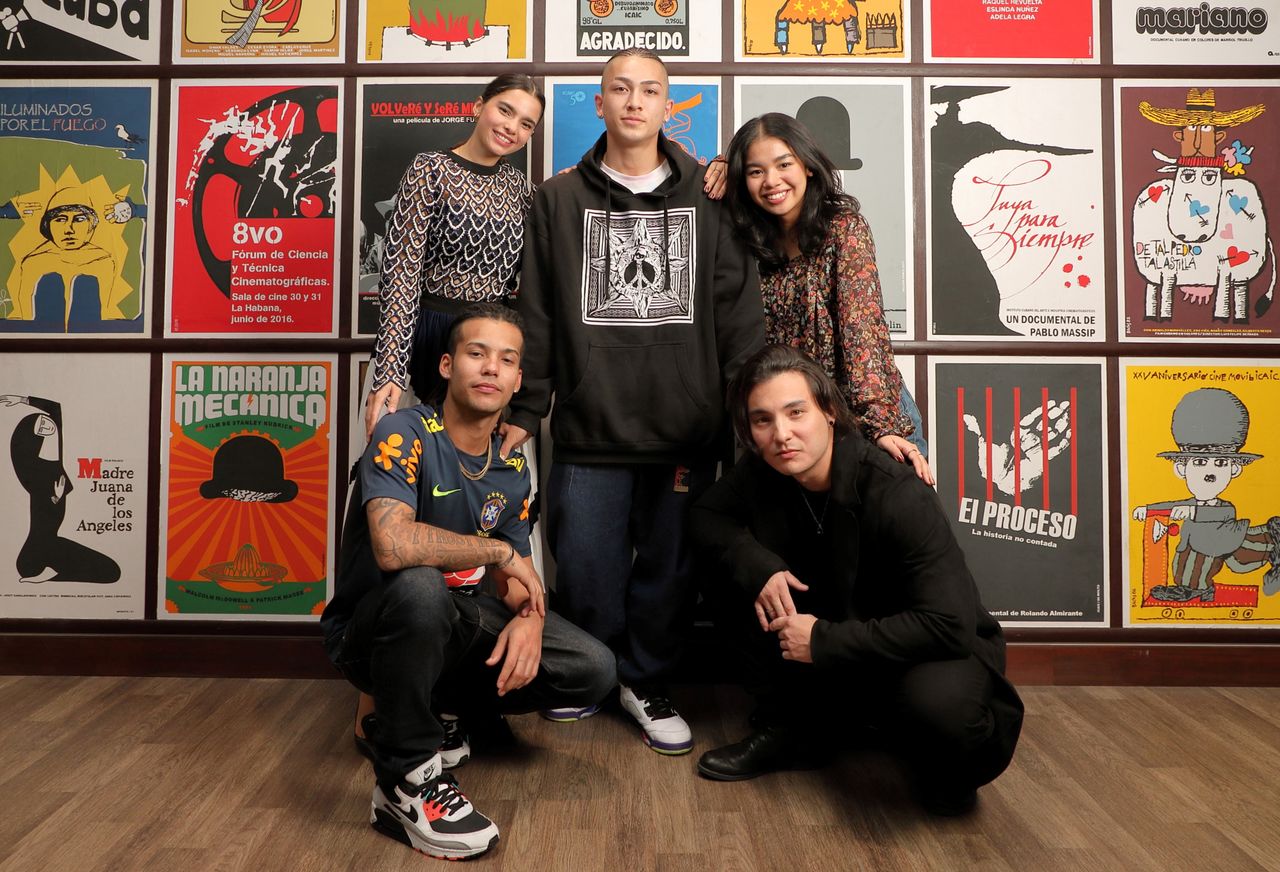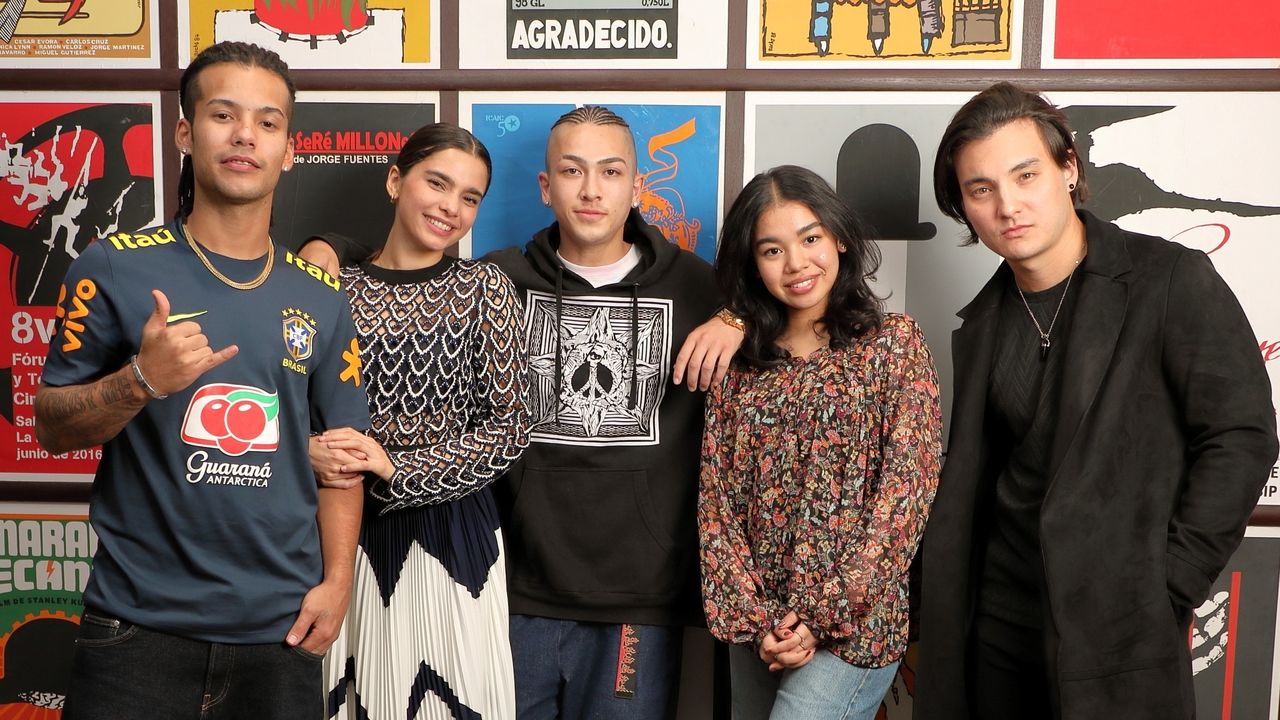
“Familia”: A Story of Japan and its Brazilian Community
Cinema- English
- 日本語
- 简体字
- 繁體字
- Français
- Español
- العربية
- Русский
The foreign population of Japan was 2.96 million as of the end of June 2022, well above 2% of the total population. The fifth highest country by number of citizens was Brazil, with 207,000. In 1985, there were fewer than 2,000 Brazilians living in Japan, but this number increased by more than a hundredfold in just over a decade, and has remained steady at around 200,000 for a quarter of a century.
In the second half of the 1980s, when Japan’s economy was booming, Brazil was suffering from hyperinflation. Many Nikkei (people of Japanese descent) in Brazil came to Japan to work. While the Japanese government did not adopt any formal immigration policy, in 1989 it sought to meet labor shortages by changing the law to grant residence visas to third-generation Nikkei and their spouses.
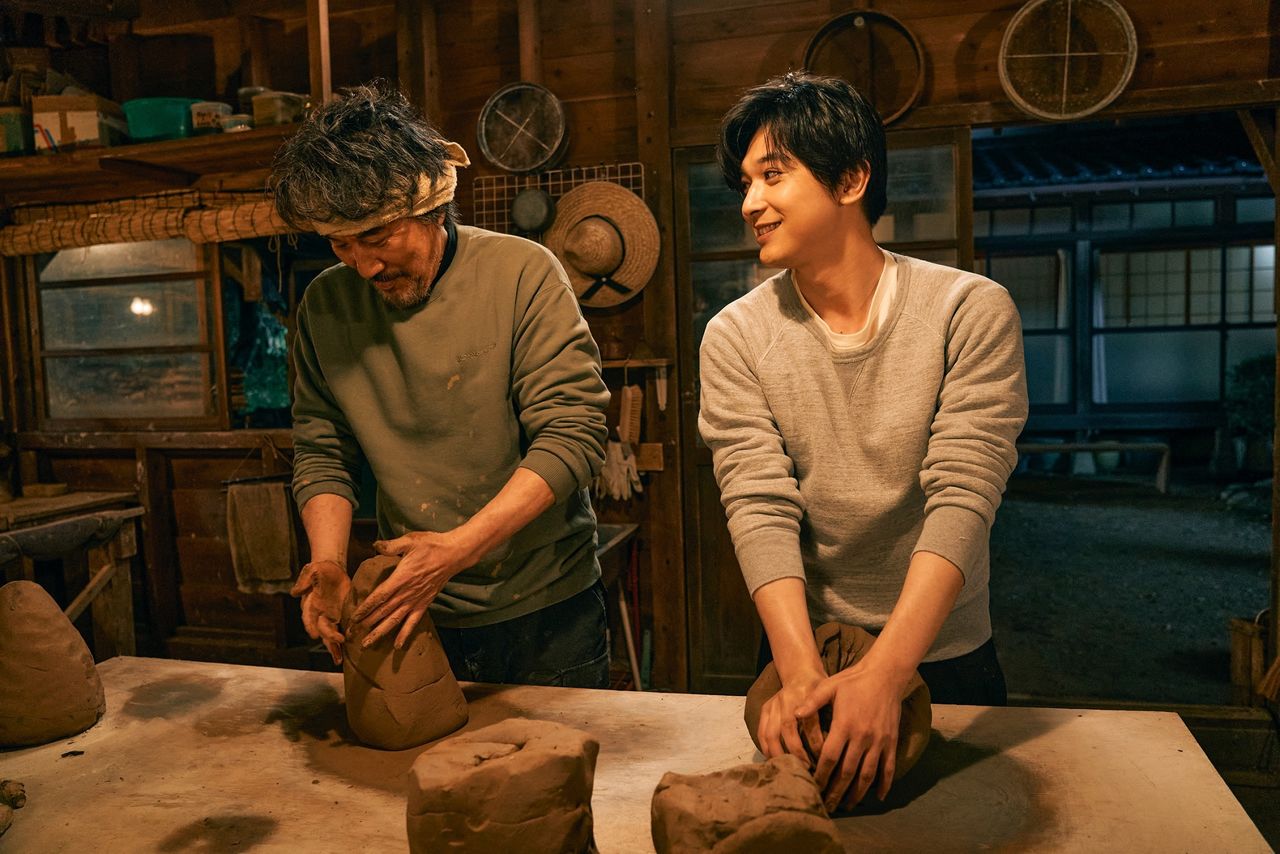
The film Familia offers a new take on family ties. (© 2022 Familia Production Committee)
Two Neighboring Worlds
Brazilian communities developed across the country, such as to the north of Tokyo, and in central Japan, around Nagoya. One of these was a filming location for Familia: the Homi danchi, or public housing complex, in Toyota, Aichi Prefecture. It was built in the 1970s, and the number of Brazilian residents has grown steadily from the late 1980s to become a majority today.
Half an hour by car from the Homi danchi, full of energetic young people driven halfway across the world by economic tides, is the city of Seto, famous for its ceramics. This small city has maintained its pottery traditions for centuries, but also faces historical pressures due to a decline in demand and a lack of successors for its artisans.
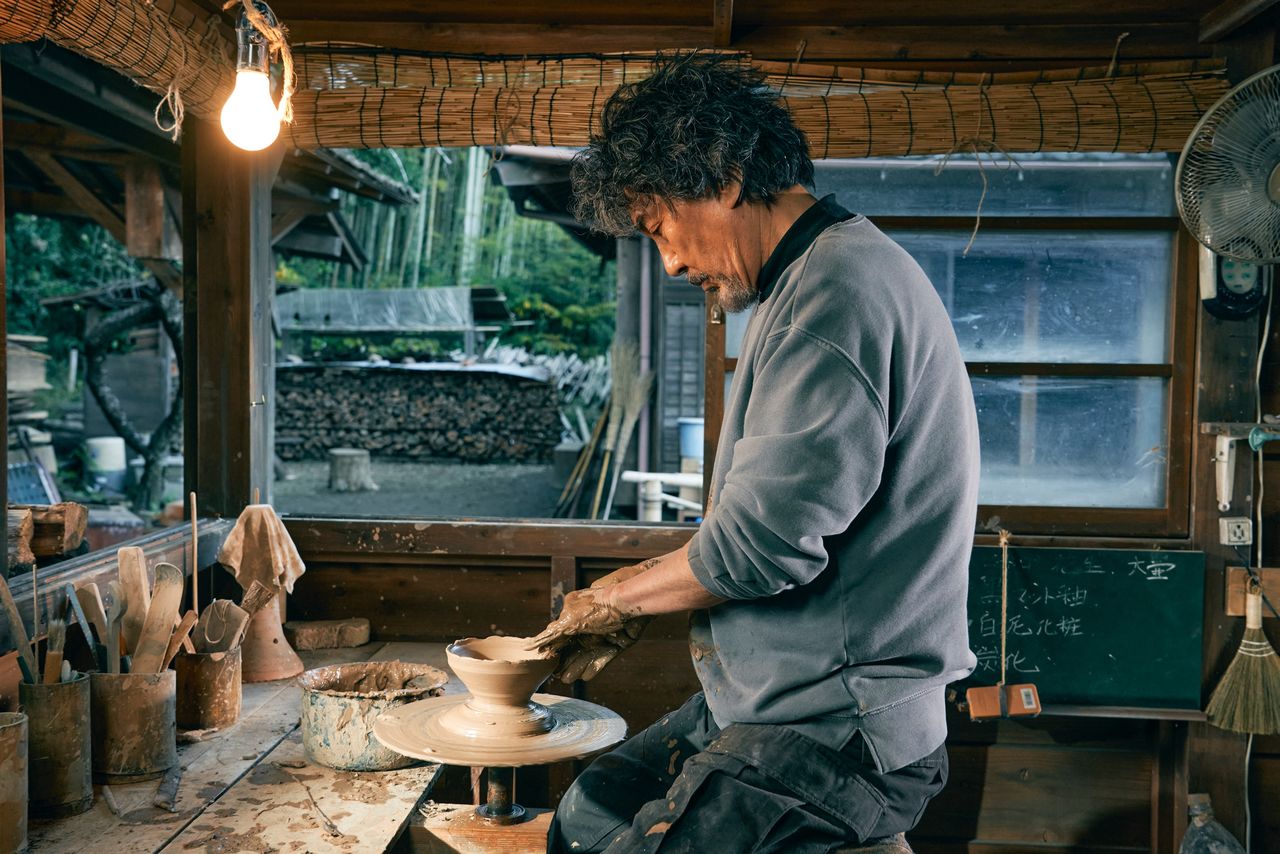
Seiji (Yakusho Kōji) is a potter creating in his home workshop. (© 2022 Familia Production Committee)
This is the setting for Familia. The protagonist Seiji, played by Yakusho Kōji, is a widower who leads a quiet life, creating ceramics in his home workshop. His only son, Manabu (Yoshizawa Ryō), returns home from Algeria, where he works as a factory engineer. He has taken time off to introduce his father to his wife Nadia (Ali Malyka), who he married while away.
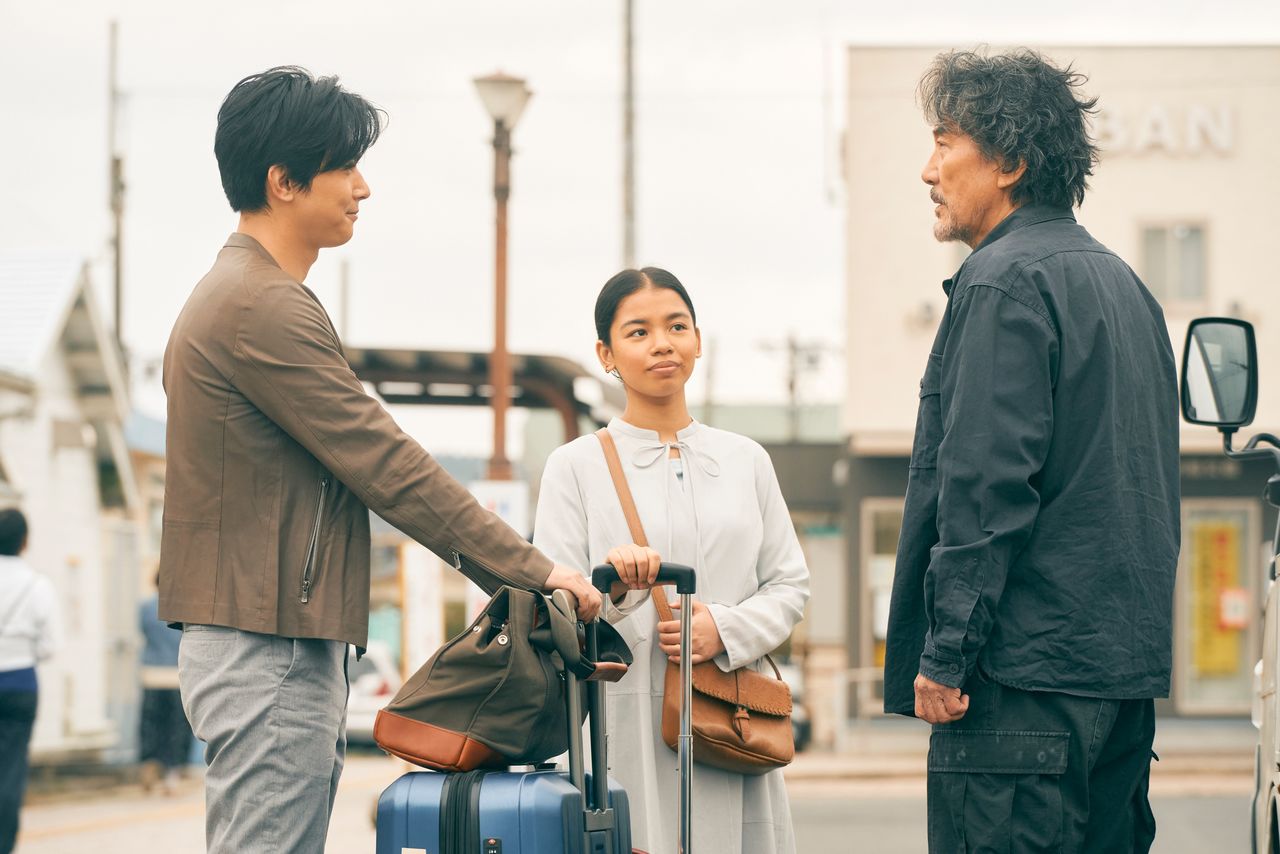
Manabu brings his new wife back to Japan to meet his father. (© 2022 Familia Production Committee)
An incident takes place while they are staying at Seiji’s house. A young man they do not know crashes Seiji’s car when he tries to steal it. This is Marcos (Lucas Sagae), a Brazilian from the next town’s danchi, who got mixed up in trouble caused by his friend Manoel (Gustavo Sumida). He is fleeing from a Japanese gang after being beaten up, and Seiji and the others tend to his injuries.
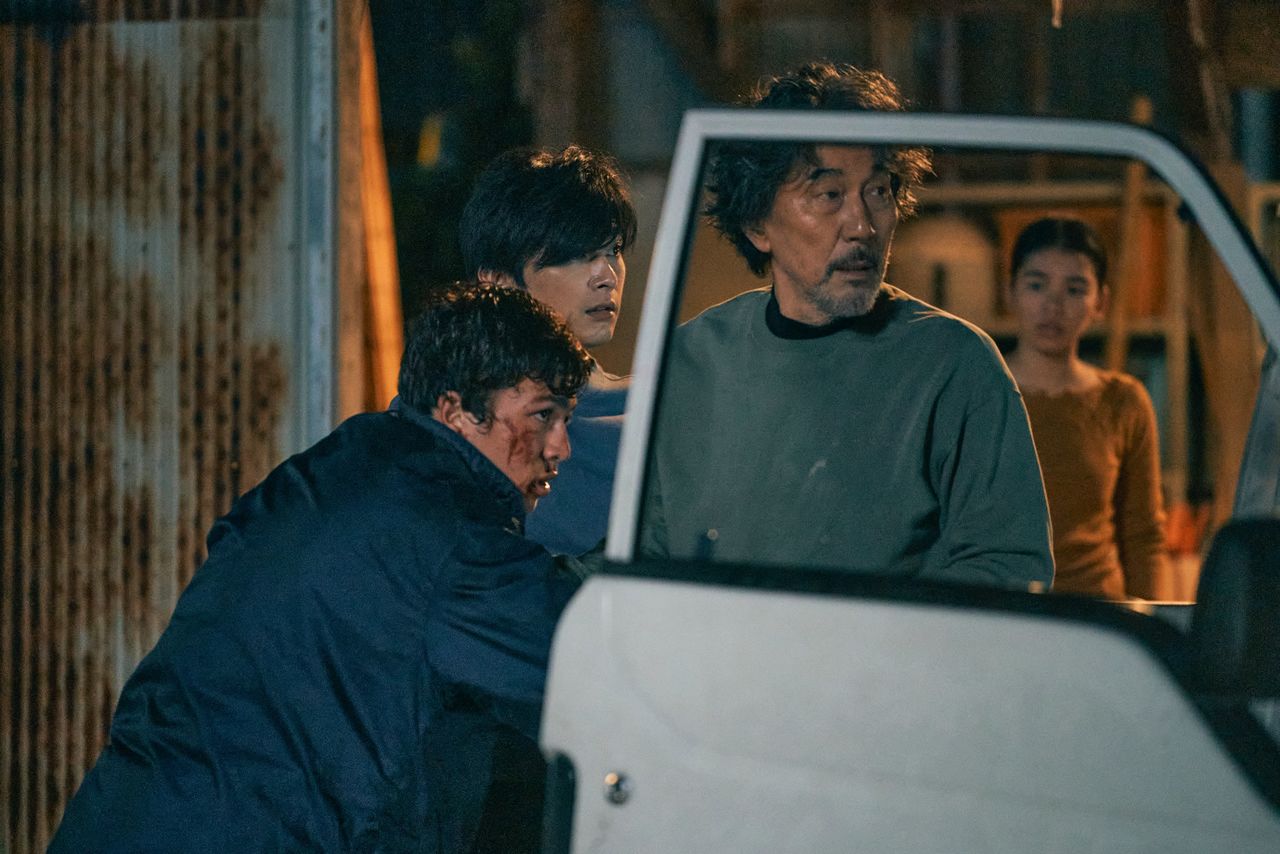
Marcos (left) takes shelter in Seiji’s house. (© 2022 Familia Production Committee)
Some days later, Marcos’s girlfriend Erika (Fadile Waked) comes to thank Seiji. Having heard from Marcos about the car, she comes to apologize and invite the family to a Brazilian community party. This is the start of a closer relationship between the two groups, but Marcos is slow to open up. He and another friend Rui (Alan Shimada) face relentless attacks from the gangsters, and Seiji himself is drawn in.
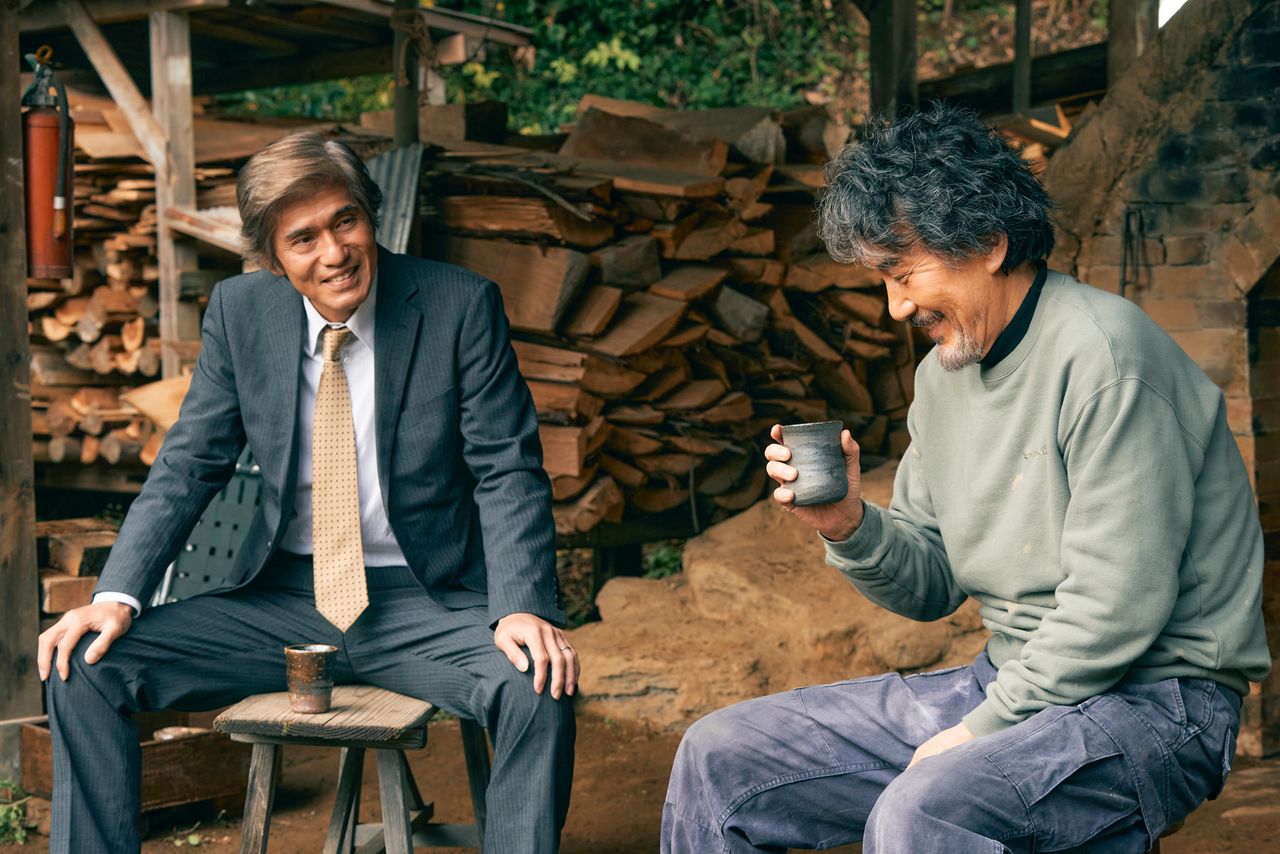
Satō Kōichi plays Seiji’s childhood friend Komada, a police officer approaching retirement. (© 2022 Familia Production Committee)
The pottery town, rich in nature, where Seiji focuses on his craftsmanship contrasts with an inorganic world of concrete. The transitions between the two neighboring worlds make for compelling viewing. The realism of the scenes in the Brazilian community, such as a nightclub full of young people moving to hip hop rhythms, comes from having real members of the community acting in the film.
New to Acting
There were 270 people at the auditions to cast Brazilian roles, and all of those chosen by director Narushima Izuru were without previous acting experience. We spoke to the five cast members playing non-Japanese parts.
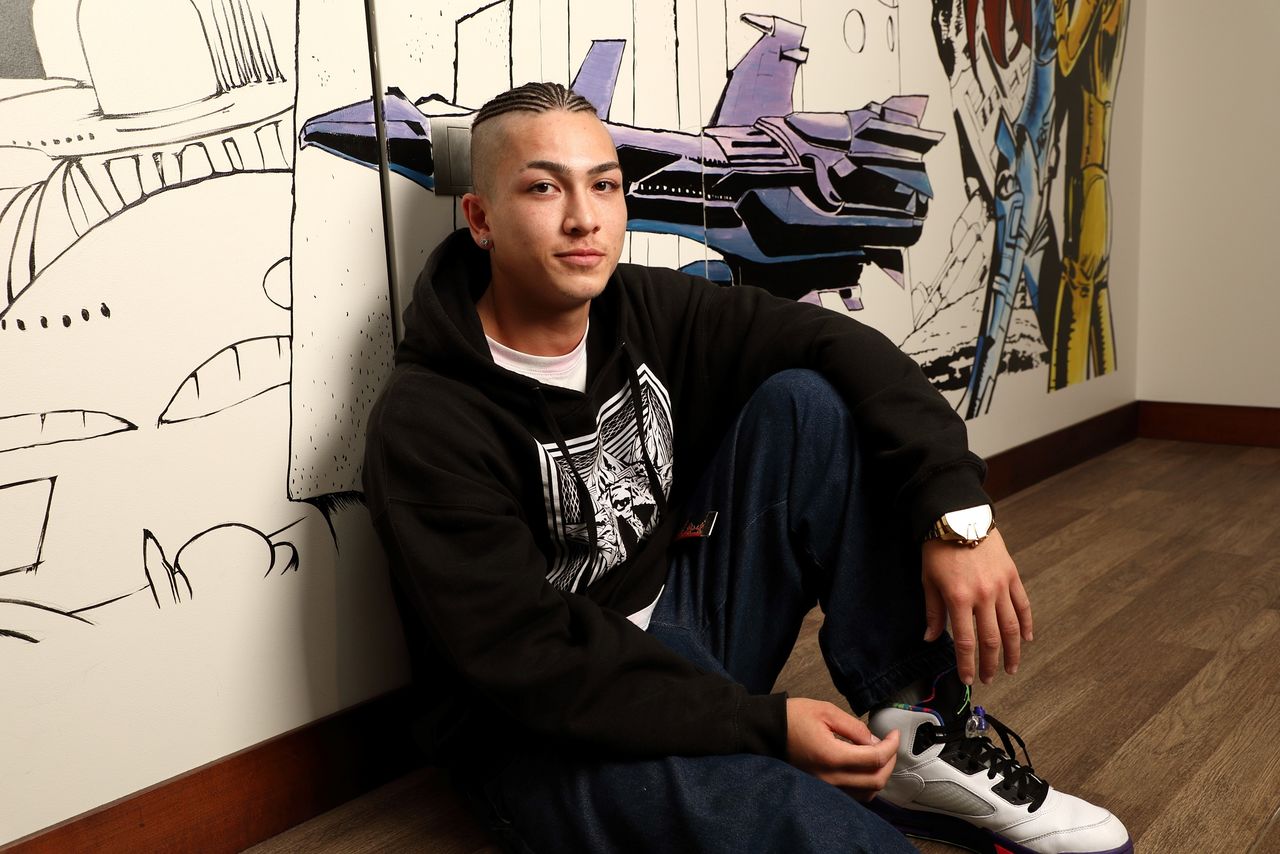
Lucas Sagae was born in Gifu Prefecture in 2004.
Lucas Sagae, who plays the supporting role of Marcos, was born in the Brazilian community in Kani, Gifu Prefecture, and is a professional kickboxer. “I found about the audition from a poster at the gym, and decided to have a shot after talking with my dad,” he says. “I’d thought about trying out magazine modeling, but never imagined acting in a film.”
Also in a supporting role, Fadile Waked, who plays Erika, came to Japan at the age of 9 and was raised in Nagoya before moving to Tokyo at 20, where she’s attached to a modeling agency. She says, “As a model, I’d appeared mainly in commercials, but a part of me dreamed of becoming an actress. When I heard about an audition for Brazilians through my agency, I told them straight away, ‘I’ll be there.’”

Fadile Waked was born in Brazil in 1988.
Gustavo Sumida, who plays Manoel, was also born in Brazil, and came to Japan at the age of eight. “I wanted to be an actor, but I’d given up,” he says. “A friend with a modeling agency in Tokyo told me about the audition. When I heard the name of the director and searched online, I found he was an amazing person. So I wanted to do the audition.”
Alan Shimada performs as Flight-A with the hip hop group Green Kids in Iwata, Shizuoka Prefecture. In the film, he plays a rapper called Rui, who is attacked by gangsters together with Marcos, and also appears alongside his band members. “We went to audition in Hamamatsu, but we were late,” he says. “After we wrote our names and went through to a room at the back, the director was sitting there in silence with his arms folded. It was scary!”
Ali Malyka is the only one of this group who is not Brazilian. She plays Nadia, the wife of Yoshizawa Ryō’s character Manabu. “My mom is Japanese and my dad is Pakistani,” she says. “I was born in Japan, and lived in Pakistan from age seven to sixteen. I’d only just come back to Japan when I auditioned, so I was asked lots of questions about life in Pakistan, and religion and people’s way of thinking there.”
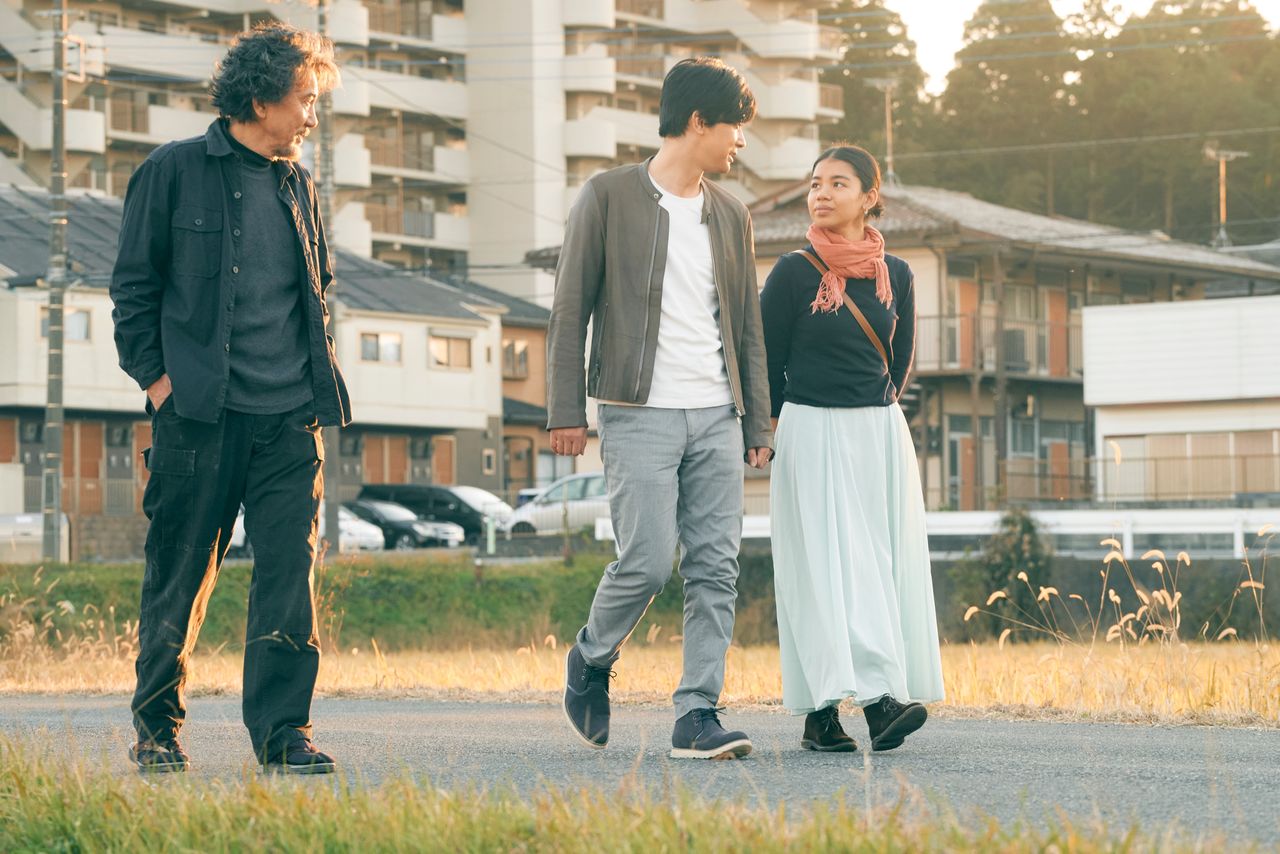
Nadia shows she has a beautiful singing voice on the way back from the party at the danchi. (© 2022 Familia Production Committee)
After the audition, there were about three months devoted to various kinds of practice. “I remember the director telling us to change at a cellular level,” says Ali.
“He corrected how we breathed, spoke, stood, and walked, as well as other habits we had picked up without knowing it,” Waked says. “He told me to forget about Fadile and live as Erika for the next year. I had to curl my hair, which was ordinarily straight, for months on end to get into the role. There was another candidate who also came to the workshops, and the decision to cast me only came right at the end. I prayed every day.”
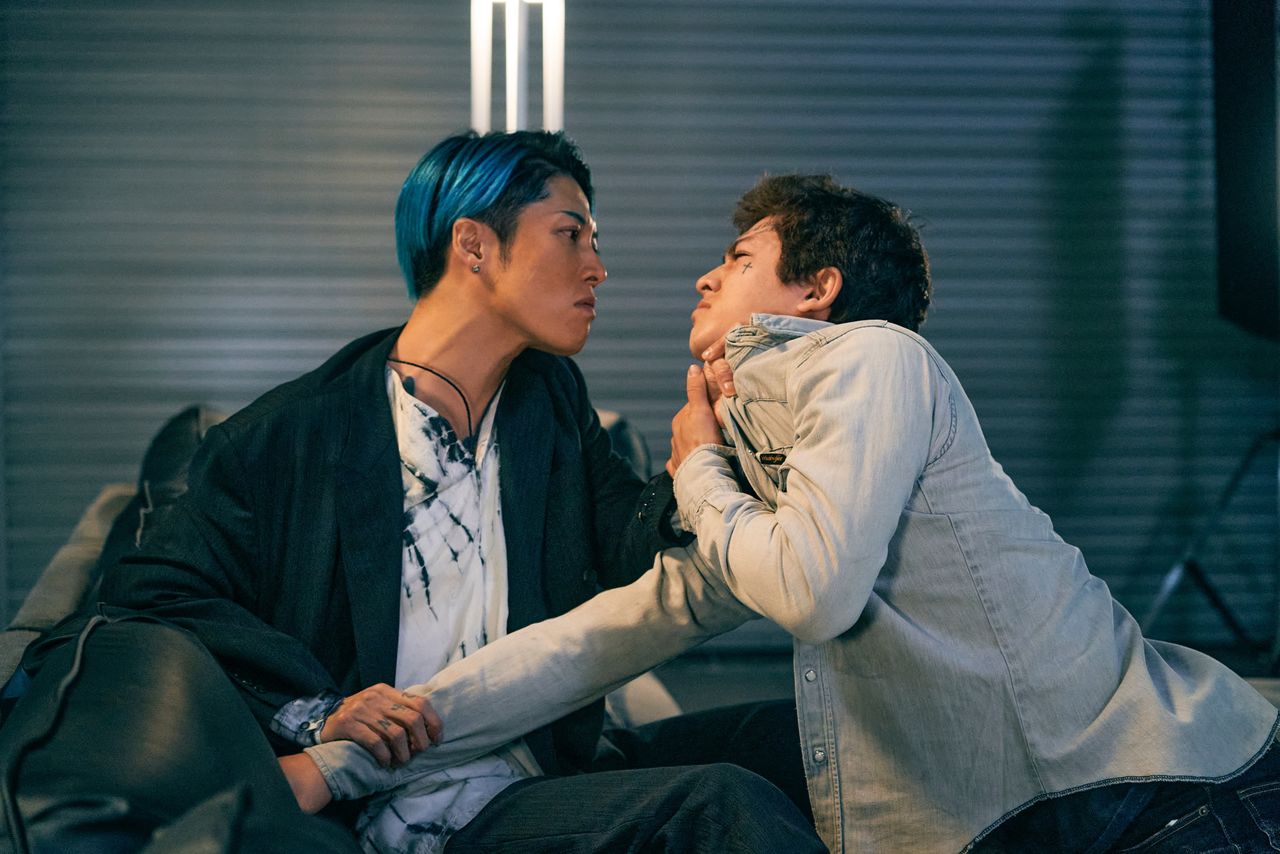
The musician Miyavi plays the gang leader Kaito, who is the son of a powerful local businessman and hates Brazilians. (© 2022 Familia Production Committee)
There were also three candidates in the workshops for the two roles of Marcos and Manoel; the candidate who was not chosen appeared in the film as an extra.
After the workshops were over, and almost as soon as filming began, it was postponed due to the COVID-19 pandemic. Waked says that although she was worried about whether it would start again, she did not really think such a strong project would be easily abandoned.
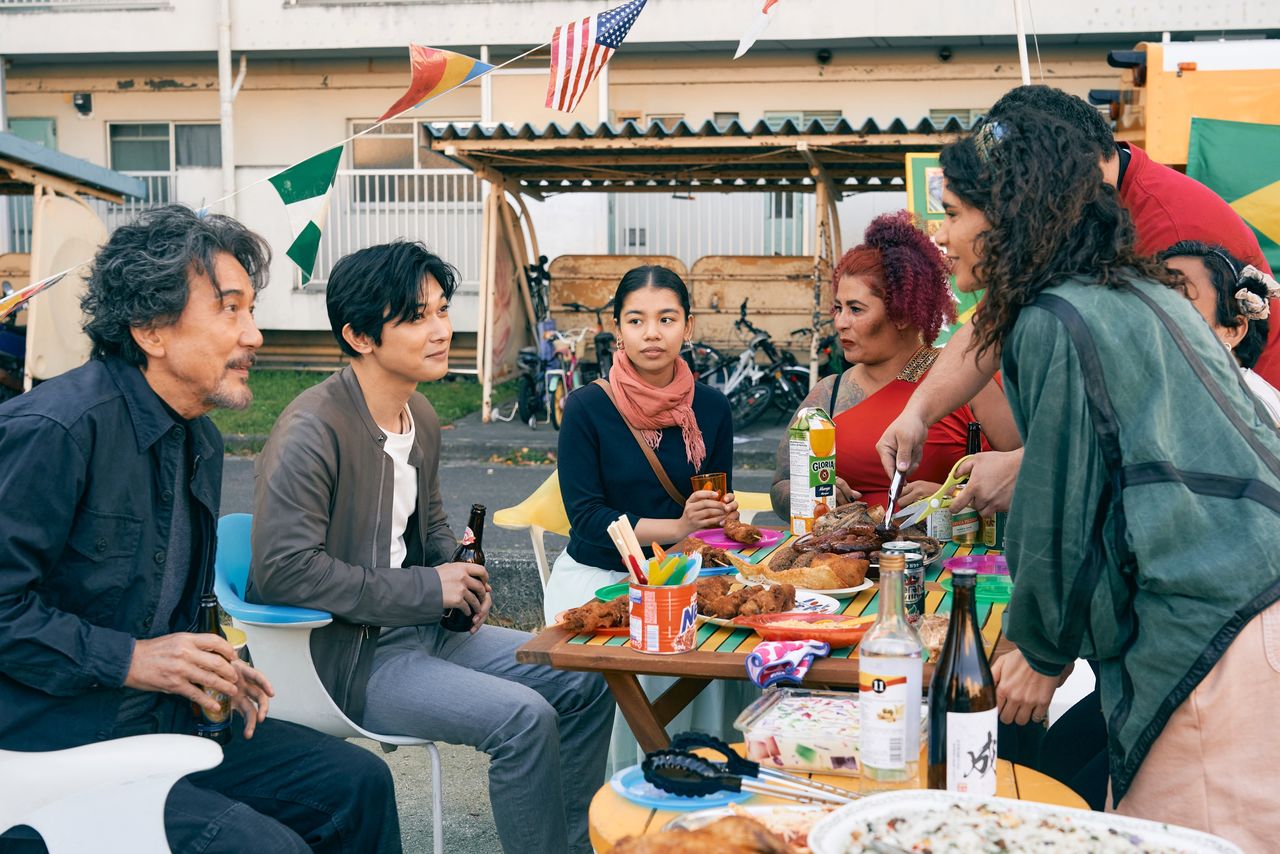
Seiji and his son and daughter-in-law are entertained by Erika’s family. (© 2022 Familia Production Committee)
Nationality and Belonging
The Brazilian actors have different backgrounds to living in Japan. “Mom is a Nikkei Brazilian,” Sagae says, “and she came with my dad to work. I was born and raised in Japan, and I’ve never been to Brazil.”
“I was born to a Lebanese father and Brazilian mother in Brazil,” Waked says. “They split up, and Mom married a Nikkei Brazilian, and we came to Japan fifteen years ago. I lived in rural Brazil and only spoke Portuguese, so this was a culture shock. I feel I’ve overcome lots of challenges to get where I am today. But there were many Brazilians in my Nagoya danchi, we could buy Brazilian food, and there was a Portuguese interpreter at school, so I’ve also been one of the lucky ones.”
Shimada’s parents also came to Japan to work. “Probably at first they planned to go back to Brazil once they’d saved some money,” he says. “They’d built a house over there, but once we kids got bigger and got used to living in Japan, we said we didn’t want to go, and so the family stayed. At home, we speak Portuguese. Mom and Dad have lived in Japan for about 30 years, but don’t speak Japanese. Going home, it’s like another world.”
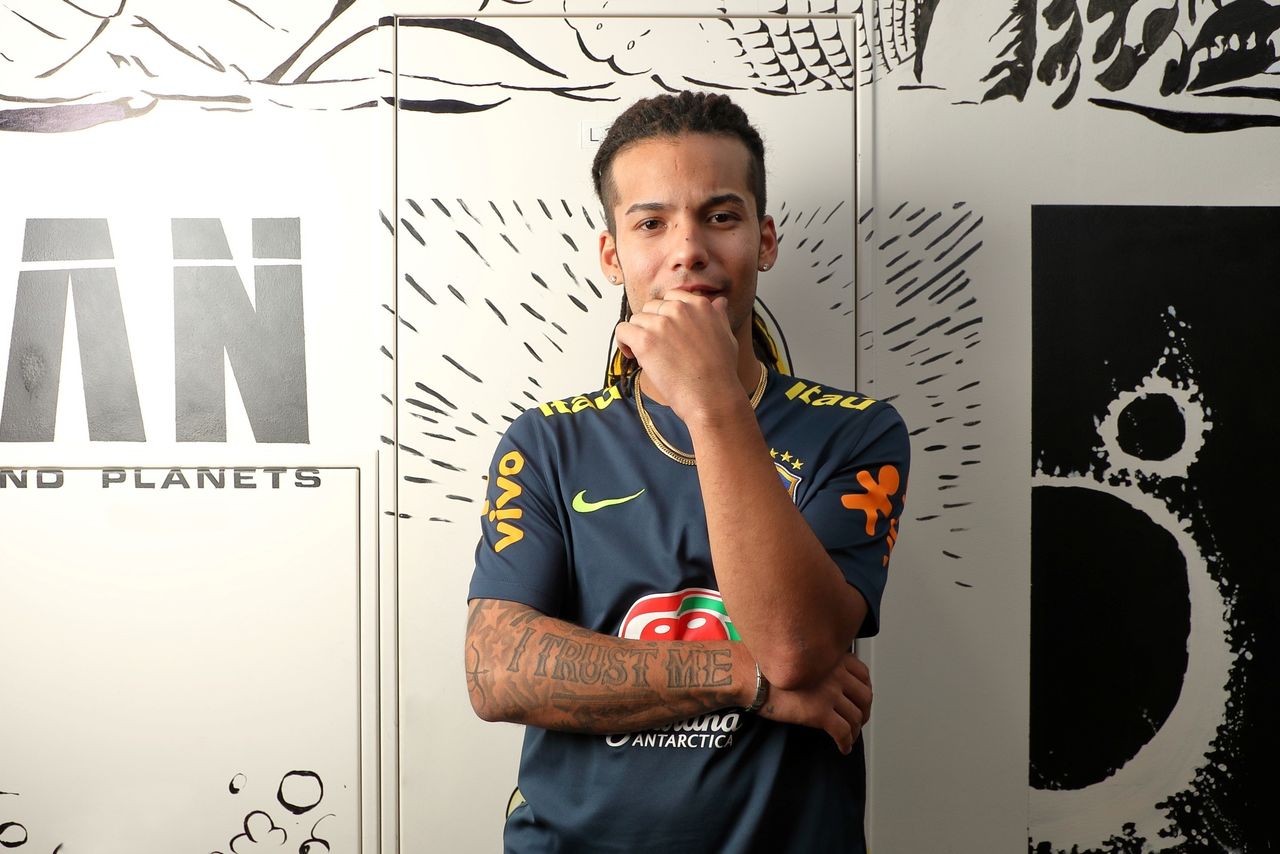
Lima Alan Shimada was born in 1988 in Shizuoka Prefecture. He performs as Flight-A in the hip hop group Green Kids.
Sumida says his parents came to work too. He went to a Japanese elementary school for six months, but switched to a Brazilian school and learned in Portuguese, as the family planned to return. “We stayed in the end, so it would have been better to have gone to the Japanese school,” he says. “I have a brother twelve years older than me who got mixed up in drugs like Manoel. That was one reason we came to Japan. My parents wanted to take me away, so I wouldn’t be influenced. And that’s a reason for me not wanting to go back to Brazil.”
On the question of other people’s perceptions, Ali comments, “I have Japanese nationality, and I don’t think I’m foreign, but that’s how others around me see me.”
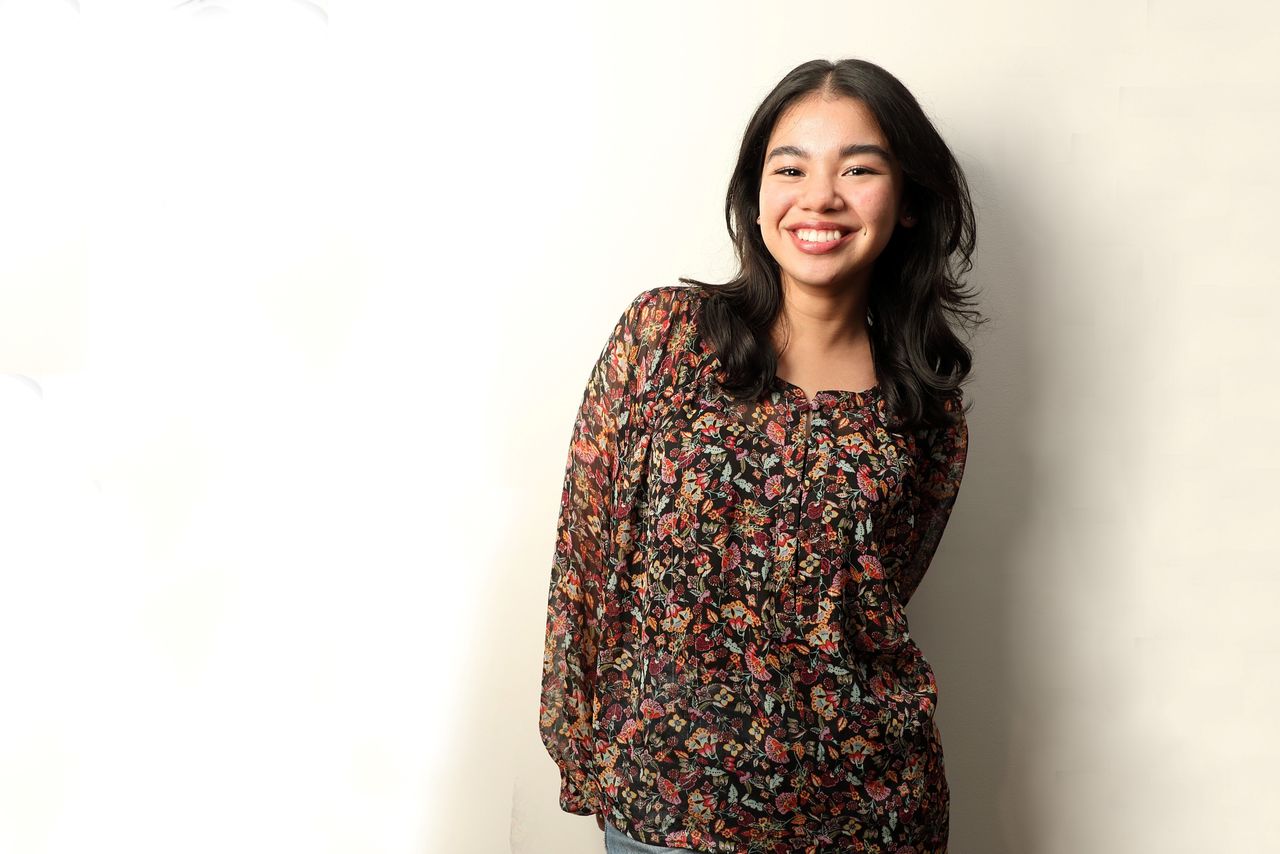
Ali Malyka was born in 2002 in Shizuoka Prefecture.
“I don’t think it’s so important whether someone is foreign or Japanese. Still, I’m proud to be Brazilian,” Sagae says. Shimada agrees, saying that he has permanent residency, but chose Brazilian nationality at the age of 20.
Waked says she is proud to be seen as Brazilian. “When I’d just come to Japan and was going to school, there was a time when I wished I’d been born Japanese. But now I’m glad to be Brazilian. And it meant I could act in this film.” Sumida comments that he’s Brazilian, but wherever he might go, he’d be seen as a foreigner, whether he remains in Japan or heads to Brazil.
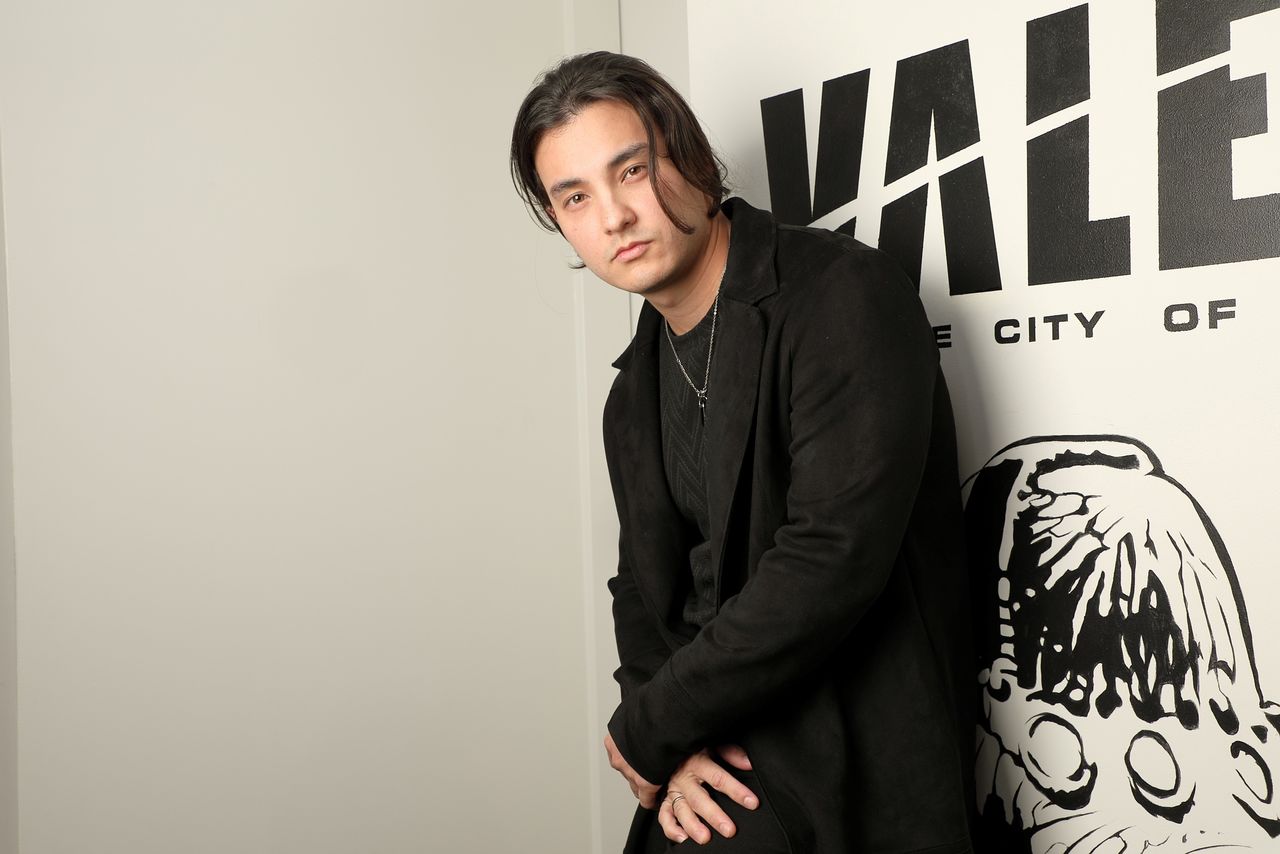
Gustavo Sumida was born in Brazil in 1996.
“I was bullied all through elementary, junior high, and high school,” Sagae says. “There were times I didn’t want to go to school, or I felt life was hard, but those experiences shaped my thinking. Whatever you look like or your nationality, we’re all human. I’d like those bullies to think about what it would be like to be bullied themselves.”
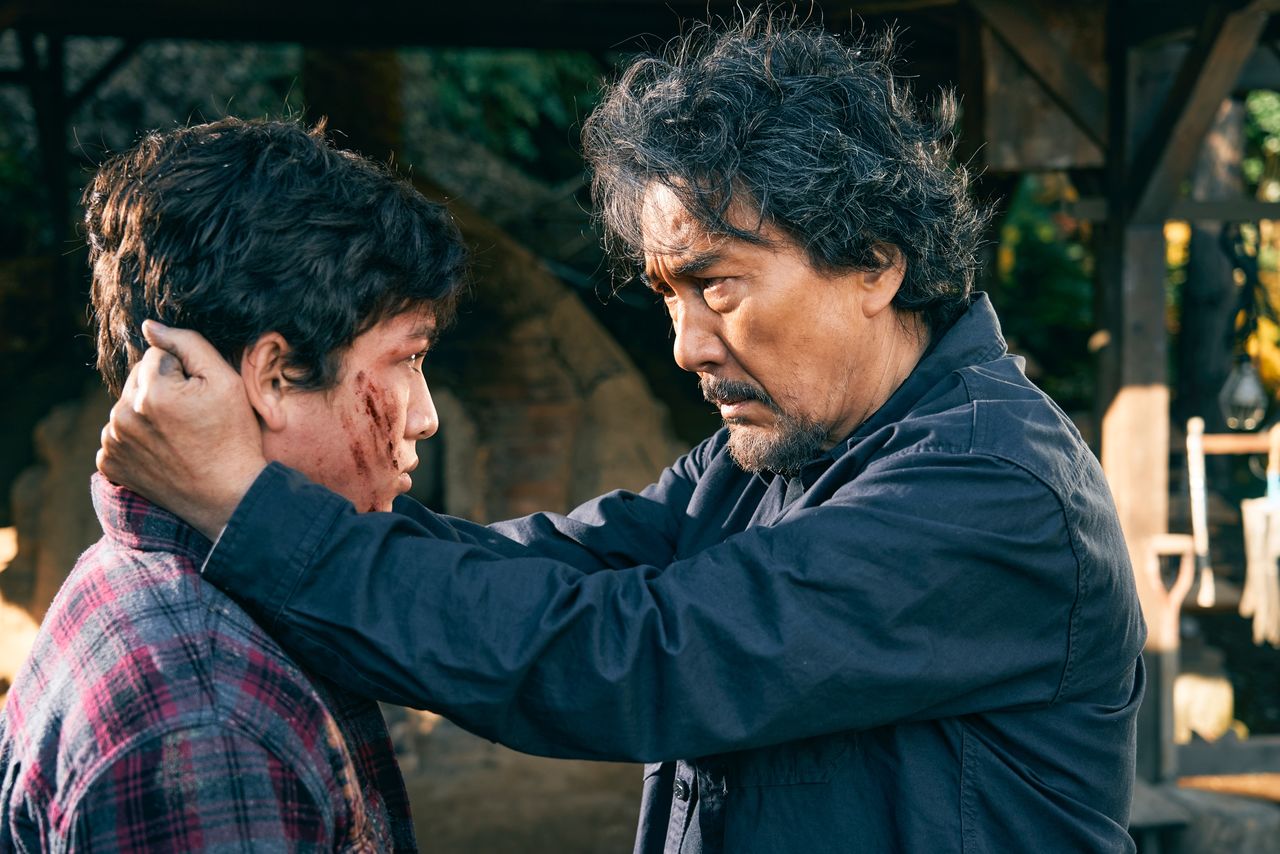
Seiji and Marcos get past their differences to make a connection. (© 2022 Familia Production Committee)
As to whether they’d like Japan to change, Waked says that “You’re treated a little different if you’re not Japanese. I think it would be great just to be treated normally.”
Sagae says that more foreign language signs alone do not make Japan an easier place to live for non-Japanese. “There needs to be a change in how people think. But not only for Japanese, and foreigners too mustn’t create reasons for others to think badly of them. I hope this film will help change people’s thinking.”
(Originally published in Japanese on January 11, 2023. Interview photographs © Hanai Tomoko. Interview and text by Matsumoto Takuya of Nippon.com.)
